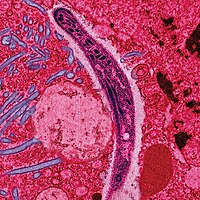
Photo from wikipedia
Helminths are large multicellular parasites responsible for widespread chronic disease in humans and animals. Intestinal helminths live in close proximity with the host gut microbiota and mucosal immune network, resulting… Click to show full abstract
Helminths are large multicellular parasites responsible for widespread chronic disease in humans and animals. Intestinal helminths live in close proximity with the host gut microbiota and mucosal immune network, resulting in reciprocal interactions that closely influence the course of infections. Diet composition may strongly regulate gut microbiota composition and intestinal immune function and therefore may play a key role in modulating anti‐helminth immune responses. Characterizing the multitude of interactions that exist between different dietary components (e.g., dietary fibres), immune cells, and the microbiota, may shed new light on regulation of helminth‐specific immunity. This review focuses on the current knowledge of how metabolism of dietary components shapes immune response during helminth infection, and how this information may be potentially harnessed to design new therapeutics to manage parasitic infections and associated diseases.
Journal Title: Parasite Immunology
Year Published: 2022
Link to full text (if available)
Share on Social Media: Sign Up to like & get
recommendations!